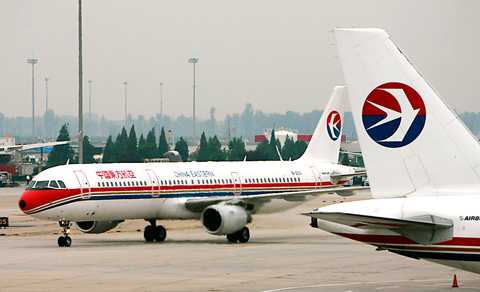China Eastern Airlines (中國東方航空) said yesterday it had received a government injection of 2 billion yuan (US$290 million) to overcome difficulties amid the financial crisis.
The money will reduce the financial strain faced by China’s third-largest carrier, Liu Jiangbo (劉江波), a vice president of the parent company China Eastern Air Holding Co, said in a statement.
“China Eastern has recently received an injection of 2 billion yuan from the state,” Liu said.

PHOTO: AFP
“Operations have maintained good momentum due to various reform measures and have improved from late last year,” he said.
The latest capital injection brings the total amount of government aid awarded to the airline in the past six months to 9 billion yuan.
China Eastern suffered a net loss of 15.3 billion yuan last year because of falling passenger numbers, rising fuel costs and bad bets on fuel hedging contracts.
China Eastern said last week it was selling two Airbus A340 jets for 590 million yuan to improve its cash flow.
The Shanghai-based airline said in a statement its net profit for the first three months of the year totaled 40.1 million yuan, down 81 percent from 210.8 million a year earlier.
The carrier said revaluation gains of 422.0 million yuan in its fuel hedging contracts for the first quarter on higher international oil prices help offset losses from weak travel demand.
China Eastern and its bigger rivals, China Southern Airlines (中國南方航空公司) and Air China (中國國際航空), met strong headwinds last year as a slew of natural disasters and a slowing economy hit air travel.
Passenger demand has recovered thanks to Beijing’s aggressive efforts to prop up economic growth, with volumes up 14.6 percent in the first quarter, according to the Civil Aviation Administration of China.
But analysts said improved passenger numbers and the latest cash injection were unlikely to improve China Eastern’s overall financial position given its massive debt, which exceeded its total assets by ten billion yuan at the end of March.
“It will lower its financial [debt-related] expenses but the impact is likely to be minimal for such a big company,” said Huang Jinxiang, a Beijing-based analyst with Guosen Securities.
“Even if it managed to be profitable this year, it would be insufficient to lower its debt ratio significantly,” he said.
The outlook for China Eastern and the whole aviation industry this year is now highly dependent on severity of the A(H1N1) flu epidemic, which would weakened air travel, Huang said.
“They would have swung back into profit had it not been for the flu fears,” he said.

SECURITY: As China is ‘reshaping’ Hong Kong’s population, Taiwan must raise the eligibility threshold for applications from Hong Kongers, Chiu Chui-cheng said When Hong Kong and Macau citizens apply for residency in Taiwan, it would be under a new category that includes a “national security observation period,” Mainland Affairs Council (MAC) Minister Chiu Chui-cheng (邱垂正) said yesterday. President William Lai (賴清德) on March 13 announced 17 strategies to counter China’s aggression toward Taiwan, including incorporating national security considerations into the review process for residency applications from Hong Kong and Macau citizens. The situation in Hong Kong is constantly changing, Chiu said to media yesterday on the sidelines of the Taipei Technology Run hosted by the Taipei Neihu Technology Park Development Association. With

CARROT AND STICK: While unrelenting in its military threats, China attracted nearly 40,000 Taiwanese to over 400 business events last year Nearly 40,000 Taiwanese last year joined industry events in China, such as conferences and trade fairs, supported by the Chinese government, a study showed yesterday, as Beijing ramps up a charm offensive toward Taipei alongside military pressure. China has long taken a carrot-and-stick approach to Taiwan, threatening it with the prospect of military action while reaching out to those it believes are amenable to Beijing’s point of view. Taiwanese security officials are wary of what they see as Beijing’s influence campaigns to sway public opinion after Taipei and Beijing gradually resumed travel links halted by the COVID-19 pandemic, but the scale of

A US Marine Corps regiment equipped with Naval Strike Missiles (NSM) is set to participate in the upcoming Balikatan 25 exercise in the Luzon Strait, marking the system’s first-ever deployment in the Philippines. US and Philippine officials have separately confirmed that the Navy Marine Expeditionary Ship Interdiction System (NMESIS) — the mobile launch platform for the Naval Strike Missile — would take part in the joint exercise. The missiles are being deployed to “a strategic first island chain chokepoint” in the waters between Taiwan proper and the Philippines, US-based Naval News reported. “The Luzon Strait and Bashi Channel represent a critical access

Pope Francis is be laid to rest on Saturday after lying in state for three days in St Peter’s Basilica, where the faithful are expected to flock to pay their respects to history’s first Latin American pontiff. The cardinals met yesterday in the Vatican’s synod hall to chart the next steps before a conclave begins to choose Francis’ successor, as condolences poured in from around the world. According to current norms, the conclave must begin between May 5 and 10. The cardinals set the funeral for Saturday at 10am in St Peter’s Square, to be celebrated by the dean of the College